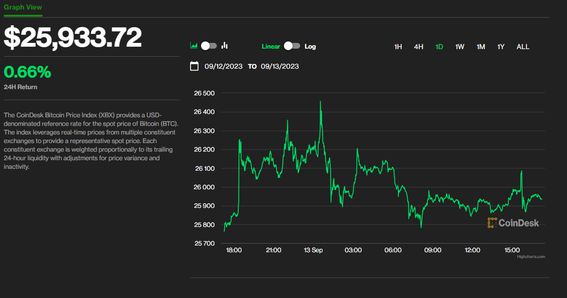Bitcoin is trading at $25,933, up 0.66% over the last 24 hours, in the hours leading up to a release of U.S. CPI data.
Despite an earlier seesaw in crypto prices, digital assets have remained fairly stable even as economists predict a small jump in CPI growth in August compared to July.
Economists anticipate a 0.6% rise in the U.S. CPI for August, an increase from July’s 0.2%. This surge is attributed to escalating oil prices, with WTI Crude Oil nearing a 2023 peak of $89 per barrel.
The CoinDesk Currency Select Index (CCYS) has also seen a modest rise of 1%, positioning itself at 1,195.80 while ether, another stands firm at $1,593, despite a 2.2% dip in the past week.
Bernd Sischka, Chief Commercial Officer at PowerTrade, a crypto options and derivatives exchange, said to CoinDesk in a note that this swift rally wasn’t necessarily driven by a genuine shift from bearish to bullish sentiments. Instead, it appeared to be spurred by aggressive short covering and a liquidity crunch, leading to rapid and volatile price movements.
“For a sustained bullish momentum in Bitcoin’s price, we’d need to see a consistent close above the critical resistance levels of $26,440 and $26,450,” Sischka said. “Although the market did breach this threshold intraday, it could not sustain above it by the close. This suggests impending near-term market weakness.”
Sischka argued that the U.S. CPI number release generally is a catalyst for more market volatility as overall orderbook liquidity remains low.
Perhaps unrelated to inflation concerns, the price of Curve’s CRV token is falling, currently trading at $0.39, down 3.3%, due to an influx of coins on exchanges, top holders reducing their holdings, and recent negative events in the protocol, including a DeFi exploit and the founder’s significant token sale.
Inflation Less of a Concern for Companies
A recent note from FactSet shows that the number of S&P 500 companies mentioning “inflation” during their Q2 earnings calls has seen a decline.
FactSet’s research shows that 296 companies cited the term during their earnings calls, marking the lowest since Q2, 2021 and the fourth consecutive quarter of decline. Notably, this figure still surpasses the 5-year average of 217 and the 10-year average of 168.
FactSet analysts found that companies that mentioned “inflation” during their Q2 earnings calls witnessed a weaker stock price performance in recent months compared to those that didn’t.
In a keynote at Korea Blockchain Week, Arthur Hayes, the founder of BitMEX and current Chief Investment Officer at Maelstrom argued that the relationship between CPI, inflation, and crypto prices isn’t what it once was.
Despite the Federal Reserve’s aggressive rate hikes, bitcoin and other risk assets have shown unexpected resilience. Hayes believes that these rate hikes, meant to counter inflation, have paradoxically spurred economic growth by stimulating spending and nominal GDP growth.
“It’s different than what’s happened before. The standard playbook is starting to break down,” Hayes said. “Whether the Fed raises or cuts, we’re in a good position as a cryptocurrency industry.”
Credit: Source link






















